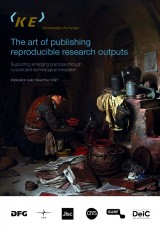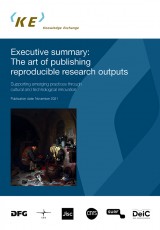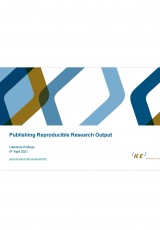
Publishing Reproducible Research Output
Reproducibility and transparency can be regarded (at least in experimental research) as a hallmark of research. The ability to reproduce research results in order to check their reliability is an important cornerstone of research that helps to guarantee the quality of research and to build on existing knowledge. The digital turn has brought more opportunities to document, share and verify research processes and outcomes. Consequently, there is an increasing demand for more transparency with regard to research processes and outcomes. This fits well with the open science agenda requiring, amongst others, open software, open data, and open access to publications even if openness alone does not guarantee reproducibility.
The purpose of this Knowledge Exchange activity was to explore current practices and barriers in the area of research reproducibility, with a focus on the publication and dissemination stage. We wanted to determine how technical and social infrastructures can support future developments in this area. In this work, we defined research reproducibility as cases where data and procedures shared by the authors of a study are used to obtain the same results as in their original work.
We captured the views of research funding organisations, research performing organisations, learned societies, researchers, academic publishers and infrastructure and service providers. We did a comprehensive literature review and a series of interviews and focus groups with a total of 51 contributors. The results of our activity give answers to the following questions:
- What are the main benefits and barriers of publishing reproducible research outputs?
- What are the roles of the different stakeholders involved?
- How expensive are reproducibility checks?
- What kind of digital tools and infrastructure are needed to publish reproducible research output?
Please check out our slide deck, final report and executive summary as well as our project materials.
The Task & Finish Group for Publishing Reproducible Research Output
The activity was led by Juliane Kant (DFG) and Anna Mette Morthorst (DeiC) as KE Group leads and Birgit Schmidt (Göttingen State and University Library) and Jeroen Sondervan (Utrecht University) as expert leads.
A full list of all participants of the Task & Finish group who contributed to this activity is available at the end of this page.

















